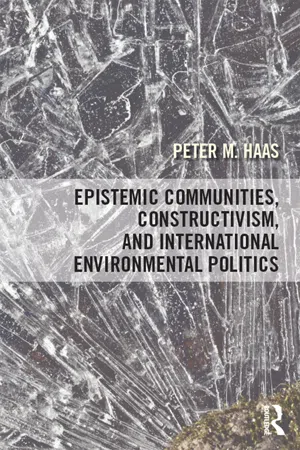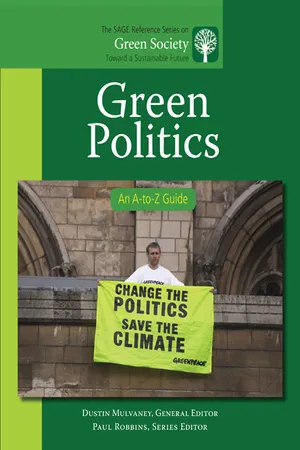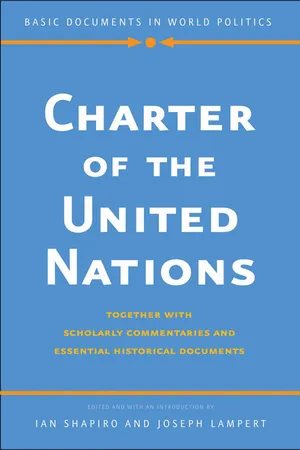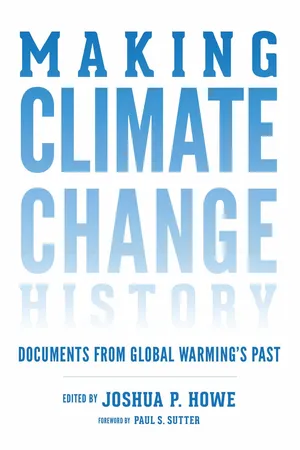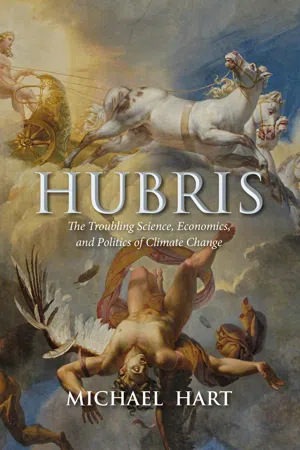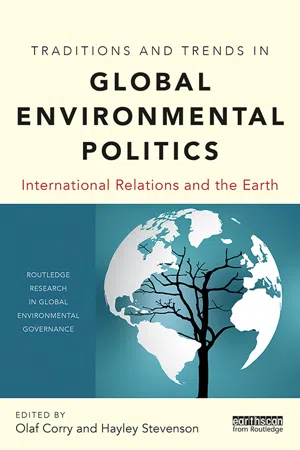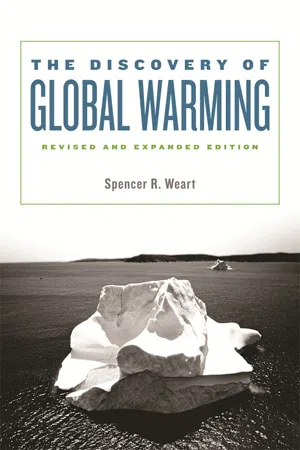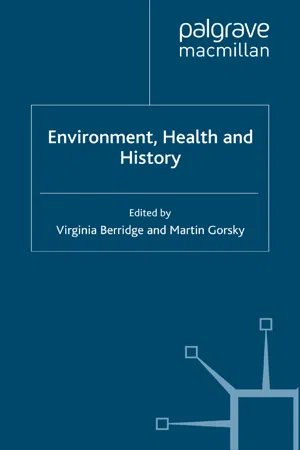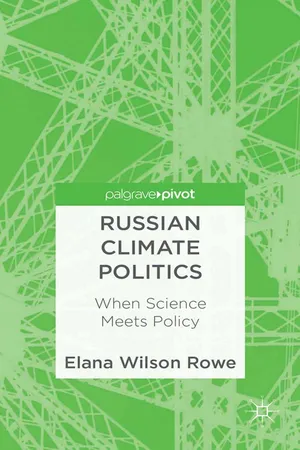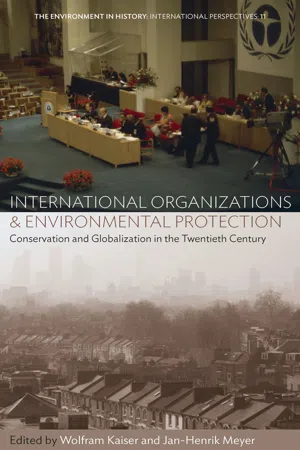Politics & International Relations
IPCC
The Intergovernmental Panel on Climate Change (IPCC) is a scientific body under the United Nations that assesses the latest research on climate change. It provides policymakers with regular assessments of the scientific basis of climate change, its impacts, and potential adaptation and mitigation strategies. The IPCC's reports are influential in shaping international climate policy and agreements.
Written by Perlego with AI-assistance
Related key terms
1 of 5
12 Key excerpts on "IPCC"
- Peter Haas(Author)
- 2015(Publication Date)
- Routledge(Publisher)
The climate change regime, the focus of the majority of global environmental diplomatic efforts during the 1990s, has also developed through a deliberate effort by diplomats to base policy on strong scientific foundations through its Intergovernmental Panel on Climate Change (IPCC). The IPCC is of interest because it highlights the way in which states may choose to shape the science advisory process. A closer look at the interplay of science and power in the IPCC reveals empirically how this dynamic interaction operates in this key contemporary issue, as well as analytically establishing the political limits to autonomous science and social learning. The scientific consensus is not yet strong, and thus the available scientific knowledge is not fully usable. Yet, in the case of climate change, the fact that usable knowledge is not yet available for climate change has much to do with the political choices associated with the design of the IPCC, and thus suggests the political limits to states’ willingness to confer some degree of autonomy to scientific institutions and to defer to their guidance.The IPCC is one of the most concerted efforts by the international community to harness usable knowledge for addressing transboundary and global environmental threats (Agrawala 1998; Agrawala 1998; Skodvin 2000; Skodvin 2000; Siebenhuner 2002; Siebenhuner 2003; Kameyama 2004). The IPCC was established in 1988 as the principal international science policy advisory body for global warming, but is widely believed to have also been formed politically in order for governments to reassert control over the science process in an issue which was accelerating on the policy agenda more rapidly than most leaders in the North were comfortable with. The IPCC was the consequence of a General Assembly initiative for a climate change regime, and did not rely on UNEP as had most previous international environmental regime initiatives. The IPCC consists of three working groups, with members chosen by governments subject to the scientific reputation of the candidates. Working Group One addresses questions of atmospheric science; Working Group Two assesses social and economic impacts and adaptation measures, and Panel Three looks at mitigation alternatives. Each working group is administered by a bureau composed of the IPCC bureau members, working group co-chairs, and vice-chairs and a technical advisory unit drawn from the country of the working group’s chair, except for the Technical Support Unit of the scientific Working Group One, which has always remained in the UK. To date the IPCC has produced three three-volume assessment reports (1990 with 1992 revisions, 1995, and 2001, with a fourth assessment underway), each with a summary for policy-makers, as well as various ad hoc special reports and technical papers. The Working Groups report to a plenary composed of government delegates, who review the Summary Reports on a line-by-line basis, and also approve the Working Group Assessments and Special Reports in more block-like fashion. All reports other than the Summary Reports rely on extensive peer reviews, and the material presented must come from peer-reviewed journals or be in the process of publication in a peer-reviewed journal. The Summary Reports, which command the greatest publicity and hence public attention, are written by the Working Group leaders along with the lead authors and specially invited experts (Skodvin 2000; Swart, Mitchell et al. 2002). The bureaus are responsible for drafting an initial table of contents and topics for each chapter. This agenda is then approved by the political plenary of the IPCC. The reports are drafted by the scientific committees, and are then approved subject to careful scrutiny by government representatives in the Plenary.- eBook - PDF
Green Politics
An A-to-Z Guide
- Dustin Mulvaney, Dustin R. Mulvaney(Authors)
- 2010(Publication Date)
- SAGE Publications, Inc(Publisher)
To deal with climate change in an objective way to mitigate its negative effects, the World Meteorological Organization and the UN Environmental Programme established the IPCC in 1988. As a scientific body, the IPCC seeks to be an information center for reports on climate change. This includes objective information about the causes of climate change. In addition, it seeks to identify, to quantify, and to understand potential environ-mental and socioeconomic consequences of climate change before they occur. The strategy of research is therefore proactive as well as informational. When the IPCC develops its reports, it does so based on scientific evidence and in the light of the often opposing viewpoints of scientists over the method and results of scientific 243 Intergovernmental Panel on Climate Change investigations. To be comprehensive, the IPCC seeks contributions from experts from the scientific community around the world. It also seeks contributions from any and all rele-vant disciplines. In addition, it uses as often as is reasonable all industrial literature and traditional practices in a two-stage review process by experts and governments. The reports that the IPCC issues are usually in a policy-ready format. However, the IPCC prepares them and issues them in a policy-neutral manner. Ultimately, it is govern-ments that respond to the issues of climate, which are for all societies a public affair that affects every person in every country. The policy portion of an IPCC report is the “Summary for Policymakers.” By accepting its report, governments are acknowledging that the scientific content of the report is valid for making policy decisions. IPCC reports are issued at regular intervals. When issued, they become a standard work of reference for experts, students, and policymakers. The first IPCC Assessment Report was issued in 1990 in Sundsvall, Sweden. - eBook - PDF
Charter of the United Nations
Together with Scholarly Commentaries and Essential Historical Documents
- Ian Shapiro, Joseph Lampert(Authors)
- 2014(Publication Date)
- Yale University Press(Publisher)
As Clark Miller has argued, one of its great successes is in facilitating and sustaining a view of the environmental challenges posed by climate change in global terms, rather than in local or regional terms, and in fostering a global epis-temic community that produces knowledge that policy makers, govern-ments, and NGOs rely upon. 18 The global stature of the panel and the central role it has played in increasing our understanding of the climate was recog-nized when it was awarded, with Al Gore, the 2007 Nobel Peace Prize. In short, the IPCC has become an important knowledge broker on climate sci-ence and is widely viewed as the authoritative voice on the matter. This situation has led one observer to conclude that the influence of the IPCC on policy has been “largely symbolic in terms of triggering and sus-taining policy concern and considerably less in shaping subsequent action.” 19 SCIENCE AND POLITICS ON A WARMING PLANET 231 The First Assessment Report, issued in 1990 , helped to spur the negotiations on the UNFCCC, agreed to in 1992 . The UNFCCC established a body com-posed of all parties to the convention, known as the Conference of the Par-ties (COP), which meets once a year, with the purpose of negotiating the details of climate regulation and to ensure compliance. A report issued by COP 2 pointed to the Second Assessment Report ( 1995 ) in urging the UN-FCCC parties to negotiate legally binding commitments on GHG emission reductions, which were eventually agreed to in the form of the Kyoto Proto-col at COP 3 in 1997 . Again, the IPCC did not directly participate in or influ-ence the negotiations, but policy makers and activists drew on the authoritative assessment reports to motivate the process. 20 CONTEMPORARY CHALLENGES The IPCC, then, has certainly been successful in producing credible, au-thoritative reports that synthesize the state of climate science and, in doing so, sustaining climate change as a salient issue. - eBook - PDF
The Role of 'Experts' in International and European Decision-Making Processes
Advisors, Decision Makers or Irrelevant Actors?
- Monika Ambrus, Karin Arts, Ellen Hey, Helena Raulus(Authors)
- 2014(Publication Date)
- Cambridge University Press(Publisher)
20 S. Agrawala, ‘Context and Early Origins of the Intergovernmental Panel on Climate Change’, Climatic Change, 39 (1998), 605–20. changing demands at the science – policy interface 133 took place in the form of discussions in the IPCC Bureau and its plenary sessions, but no formal document on the outcomes of this learning process emerged from these discussions. One of the main lessons learned by the participants in the first assessment was the political nature of the IPCC process, which was new to most of the participating scientific experts. They had to adapt to the fact that the agenda of the assessment was mostly set by political needs and that scientific outcomes would also be challenged by political decision makers. As a result, major discussions emerged about the possibilities of scientific work under political pres- sures and significant scepticism was expressed by some of the experts involved. Nevertheless, acknowledging the political function of the whole endeavour, a supplementary report was prepared by IPCC scien- tists that, together with the First Assessment Report, turned out to be highly influential on the negotiations of and final agreement on the UN Framework Convention on Climate Change (UNFCCC) in 1992. 21 The findings presented in the First Assessment Report demonstrated the urgency and the relevance of the problem of climate change to the international community. However, the assessment also acknowledged that numerous uncertainties regarding the actual human influence on climate change remained, and pointed to questions regarding the reli- ability of the model predictions and the causal relationships in the global climate system. 22 Policy makers nevertheless took the findings signifi- cantly more seriously than those of previous assessments. - eBook - ePub
States of Knowledge
The Co-Production of Science and the Social Order
- Sheila Jasanoff(Author)
- 2004(Publication Date)
- Routledge(Publisher)
Many developing country participants, however, saw the need to participate in entirely different terms. In the 1990 report of the Special Task Force, for example, developing countries noted that many issues relevant to climate change are political. Poverty, development, equity, and access to technological and financial resources (including intellectual property rights) are fundamental, they argued, to any effort to respond effectively to climate change. At the Second World Climate Conference in November, 1990, Jean Ripert, the chair of the Task Force, noted:the struggle to master a very important aspect of the future of our planet cannot be dissociated from other efforts which the international community must make to favour a general process of development, to ensure an equitable rise in standards of living, and to equalize opportunities between peoples.(Ripert 1991)If these were the objectives, developing country participation in the IPCC was woefully inadequate. Developing country leaders were certain that the IPCC could not act as an appropriate forum for formulating global responses to the problems of climate change, when framed in these broader political terms. This perception led them to reject the IPCC during UN debates over how to organize international climate negotiations. Between June and December 1990, the UN Environment Programme Governing Council and the UN General Assembly debated whether the IPCC should become the official institution for negotiating the Framework Convention. Although UNEP supported this choice, along with many industrialized countries, developing countries voted overwhelmingly to authorize the UN General Assembly to form another body for this purpose – the Intergovernmental Negotiating Committee.To understand these events more fully, it is important to consider another resource that the IPCC has drawn upon over time to shore up its authority, namely the rhetorical and institutional separation, or bounding, of science and politics. Scientific judgments, we now know, inevitably involve tacit value assumptions and choices that can have important social and political consequences. At the same time, “boundary work” separating scientific and political domains of authority and action can be an important source of legitimacy in public policy contexts, although the boundaries drawn in any given instance inevitably involve negotiations among scientists, government officials, citizens and other policy actors. By appealing to widespread public understandings of science and politics as separate spheres of social activity, boundary work thus helps bring the forms and processes of public policymaking into line with prevailing Western expectations about the nature of democratic governance and rational inquiry (Gieryn 1996; Jasanoff 1990). - eBook - ePub
Making Climate Change History
Documents from Global Warming's Past
- Joshua P. Howe(Author)
- 2017(Publication Date)
- University of Washington Press(Publisher)
But the IPCC process itself has also been shaped by the evolving politics of climate change. The science-to-politics avenue is actually a two-way street. Reading IPCC assessment reports in conversation both with each other and with documents from the political negotiations they inform provides a way to think about how both the consensusmaking process and the mechanisms of climate governance have changed over time. IPCC reports reflect developments in scientific understanding over five- to seven-year intervals, but changes in the IPCC process, the style of its publications, and the focus of its discussions also reflect the particular interests of its intended users: the international political community. In 1995, for example, the Second Assessment Report provided a detailed description of the IPCC process, now including peer review, as a response to criticism that the First Assessment Report lacked transparency and rigor. It also referred directly to the objectives of the UNFCCC, a treaty that did not yet exist in 1990 when the First Assessment Report was released. Six years later, in 2001, the Third Assessment Report built on the Second Assessment Report’s engagement with the UNFCCC in a more robust “synthesis report,” a sort of grand executive summary that linked the basic physical understanding of the climate system to the societal impacts and potential responses to climate change in order to emphasize the report’s “policy relevance” for political actors, only some of whom had signed on to the 1997 Kyoto Protocol.As it changed, the IPCC and the documents it produced remained embedded in a larger conversation about environmental governance that was also changing in the 1990s and early 2000s. The IPCC selfconsciously spoke to the treaty-protocol system of the UNFCCC. As a result, it also implicitly and sometimes explicitly engaged with concerns about economic development, technology transfer, and equity that the UNFCCC inherited from an international push in the late 1980s and early 1990s to tackle environmental problems through international legal and political agreements based on the concept of sustainable development. Defined in 1987 by the United Nations’ World Commission on Environment and Development (WCED) as “the kind of development that meets the needs of the present without compromising the ability of future generations to meet their own needs,” sustainable development became a key buzzword in international environmental politics in the early 1990s and served as the guiding principle for the United Nations Conference on Environment and Development in Rio de Janeiro, Brazil, where the UNFCCC was introduced. It also served as a bridge between the often conflicting concerns of the developed and developing worlds. - eBook - ePub
Hubris
The Troubling Science, Economics, and Politics of Climate Change
- Michael Hart(Author)
- 2015(Publication Date)
- Compleat Desktop Publishing(Publisher)
All reports come with summaries for policy makers as well as synthesis reports and technical summaries. All can be downloaded in whole or in part in pdf format at: http://IPCC.ch/publications_and_data/publications_and_data.shtml . Many are published in book form by Cambridge University Press.The IPCC’s mandate was limited to working with the existing knowledge base and using it to find the anthropogenic influence on climate change. Governments were invited to nominate their best scientists to form an intergovernmental panel that would review the available, peer-reviewed literature and prepare periodic reports summarizing the state of knowledge of the human impact on the climate system. These reports would be reviewed by government officials, presumably scientifically literate ones, who would prepare summaries of the science for policy makers. The IPCC would thus provide the intellectual and evidentiary underpinnings for action by governments, both domestically and internationally. The panel was sold to the world as an independent, objective source of advice to governments, and for the next 25 years the media faithfully echoed that myth as the panel poured out one “authoritative” report after another (see Box 5-1). In reality, the panel’s leadership was chosen from the activist scientists who had from the beginning been closely involved in developing the catastrophic climate change story. Many of the scientists who contributed to its reports formed part of a closely knit group of researchers who shared the alarmist perspective. A few scientists who were not part of the “in” group participated in the early days but soon wore out their welcome and concentrated on their own work or became much-maligned critics.292The often-hyped work of the IPCC has been proven to be seriously flawed.293 Its Summary for Policy Makers - eBook - ePub
Traditions and Trends in Global Environmental Politics
International Relations and the Earth
- Olaf Corry, Hayley Stevenson, Olaf Corry, Hayley Stevenson(Authors)
- 2017(Publication Date)
- Routledge(Publisher)
According to the IPCC – the scientific network established in 1988 to present policy-relevant information about anthropogenic climate change – there is strong evidence that human activities are destabilising the climate and the risks of leaving this interference unchecked will be dire. According to the Fifth Assessment Report (IPCC 2014) anthropogenic climate change is already occurring. At the same time the influence of the IPCC on climate regimes has been the subject of scrutiny by IR and STS scholars alike while it has been criticised and rejected by sceptics. How can political analysis shed light on the relationship between science and policy?Epistemic community: the IPCC
The IPCC is probably the best-known epistemic community in global environmental policy. It was established in 1988 by the World Meteorological Organization (WMO) in cooperation with the UNEP. It does not undertake scientific research itself but organises synthesis reports of climate-related research for decision-makers involved in the UNFCCC. The IPCC has had to create its own procedures, which have sometimes challenged the classic conception of epistemic communities. In particular there was a desire to include both policymakers and scientists from different countries, especially developing countries. The IPCC’s first chairman Bert Bolin stated: ‘Right now many countries especially developing countries simply do not trust assessments in which their scientists and policymakers have not participated. Don’t you think credibility demands global representation?’ (cited in Schneider 1991). Accordingly, the IPCC is composed of both government representatives and invited scientists. Only government representatives participate and vote in plenary sessions that approve the IPCC work programme and governance structure and elect the IPCC Chair and Bureau Members. According to Haas and Stevens, this design of the IPCC ‘is designed to keep science on a tight leash’ (2011, 147) – where governments are the ‘principal’ and the scientific community is the ‘agent’ (ibid: 148). Unsurprisingly, however, this structure is one reason why climate sceptics have criticised the IPCC as politically motivated.The IPCC has also engaged in various practices to reinforce its epistemic authority. In particular, it has sought to present unequivocal scientific statements based on the principle of consensus. In 1990 it took the decision to no longer put forward policy recommendations. Only peer-reviewed literature is considered. These actions were intended to fulfil the IPCC’s mandate to provide policy-relevant information without being policy prescriptive. Simultaneously the IPCC has emphasised the methods and findings of climate modelling as the key source of reference for its work and especially its Working Group I (on scientific evidence for anthropogenic climate change). This approach has produced a standard frame of reference for predefined spatial scales and where regional data are fed into globally aggregated models (Edwards 1996). - eBook - PDF
The Discovery of Global Warming
Revised and Expanded Edition
- Spencer R. Weart(Author)
- 2008(Publication Date)
- Harvard University Press(Publisher)
c h a p t e r e i g h t S P E A K I N G S C I E N C E T O P O W E R When a nation’s leaders face a hostile foreign power or an economic crisis, they will act. However imperfect the policy makers’ informa-tion about the risk, they know that to do nothing is itself a choice among actions, and seldom the best choice. The risk of climate change brought a different response. Here was an altogether unfa-miliar type of danger, a danger that would have remained hidden but for a few scientists whose names hardly anybody knew, a dan-ger described only by computer programs that hardly anybody un-derstood. For decades, policy makers had responded simply by spending money on research (if never enough). It was up to the world’s scientists to declare the nature of the danger, while holding to the strict rules of evidence and reasoning that made them scientists in the first place. And no declaration would have force unless it emerged from the clumsy mechanism of the Intergovernmental Panel on Climate Change, imposed by governments that had no wish to hear bad news. Unlike all earlier climate conferences and panels, the IPCC was an official intergovernmental effort, and with virtually all the world’s climate scientists and governments participating, it quickly estab-lished itself as the principal source of advice to policy makers. The key to the panel’s success was building its bureaucratic structure out of familiar components—the flexible, freewheeling groups that scientists had perfected over centuries of research and controversy. Independent task forces addressed each of the chief scientific issues. Experts reviewed the latest research publications and drafted re-ports. In informal workshops, additional experts debated every de-tail for days on end. Meanwhile, individuals argued with one an-other in letters and, increasingly, e-mails. All through 1989, 170 scientists in a dozen workshops labored to craft statements that none could fault on scientific grounds. - eBook - PDF
- V. Berridge, M. Gorsky, V. Berridge, M. Gorsky(Authors)
- 2011(Publication Date)
- Palgrave Macmillan(Publisher)
Ingar Palmlund 267 31. IPCC (2007). Climate Change 2007: Synthesis Report. Summary for Policymakers. (Geneva: World Meteorological Office). 32. UN Development Program (2007). Human Development Report 2007/2008: Fighting Climate Change: Human Solidarity In A Divided World (London: Palgrave Macmillan). 33. A. C. Revkin (2009). ‘A grudging accord in climate talks’ The New York Times, December 20, p. A1. 34. IPCC (2006). ‘Principles governing IPCC work’, Approved 1 October 1998, amended 3 and 6–7 November 2003, and 26–8 April 2006. http://www.IPCC. ch/organization/organization.htm, accessed 30 July 2009. 35. IPCC (2009). Fifth Assessment Report (AR5). http://www.IPCC.ch/activities/ activities.htm#1, accessed 21 August 2009. 36. A. C. Revkin (2009). ‘Nobel halo fades fast for climate change panel’, The New York Times, 4 August. 37. IPCC (2007). Climate Change 2007: Synthesis Report. Summary for policymakers, Contribution of Working Groups I, II and III to the Fourth Assessment Report of the Intergovernmental Panel on Climate Change [Core Writing Team, Pachauri, R.K. and Reisinger, A. (eds.)]. IPCC, Geneva, Switzerland, pp. 2, 5, 7. 38. IPCC (2007). p. 8. 39. IPCC (2007). pp. 18–20. 40. J. M. Broder (2009). ‘Climate change seen as threat to US security’, The New York Times, 9 August, p. 1. 41. UNEP (2009). Vital Ozone Graphics: Resource kit for journalists. http://www. grida.no/publications/vg/ozone/page/1379.aspx to /page1396.aspx, accessed 28 July 2009. 42. UN Environment Program (1985). The Vienna Convention for the Protection of the Ozone Layer, Preamble. 43. UN Environment Program (1987). The Montreal Protocol on Substances that Deplete the Ozone Layer, Preamble. 44. UNFCCC, Preamble. 45. IPCC (1990). Climate Change: The IPCC Scientific Assessment (Cambridge: Cambridge University Press). 46. IPCC (1992). Climate Change: Supplementary Report to the IPCC Scientific Assessment (Cambridge: Cambridge University Press). - eBook - ePub
Russian Climate Politics
When Science Meets Policy
- Kenneth A. Loparo, Elana Wilson Rowe(Authors)
- 2013(Publication Date)
- Palgrave Pivot(Publisher)
How has this change in attitude come about? There are many ways of approaching this question and economic and political incentives are an important part of the picture. In the context of understanding Russian climate policy, these concrete incentives have been relatively well-studied. An overlooked dimension needed to fully understand Russia’s climate politics – and approach to other global governance issues more generally – is the influence of scientific claims and experts themselves in the policymaking process. Scholarly work on global governance and in science and technology studies, among other disciplines, has shown the important and varied role played by experts and technocrats in international and national policymaking. Historical studies have revealed how Soviet scientists figured in politics in unexpected ways, for example by playing a decisive role in shaping the nuclear testing policy of the USSR. However, no comprehensive study of the interplay between scientific expert knowledge and contemporary Russian policymaking has been carried out.This line of question is relevant to understanding progress in international climate change politics more generally. For example, the reception of the scientific knowledge summarized in international climate change assessments, like the IPCC assessments, is often overlooked. As Lahsen (2009, p. 189) notes, ‘huge amounts of time and resources continue to be devoted overwhelmingly to the production and scientific assessment of climate science, while comparatively little attention is being given to whether or not intended audiences are receptive to the information being produced.’ We often envision science, and especially internationally produced scientific assessments, as a shared baseline or input that serves as a basis for international politics. As the Russian case study that follows shows, scientific claims in general and international scientific assessments in particular figure into policymaking in somewhat more surprising and non-linear ways than we might assume. These dynamics are especially understudied outside of North American and European contexts and the Russian case study in this book makes a contribution in this regard. - eBook - ePub
International Organizations and Environmental Protection
Conservation and Globalization in the Twentieth Century
- Wolfram Kaiser, Jan-Henrik Meyer, Wolfram Kaiser, Jan-Henrik Meyer(Authors)
- 2016(Publication Date)
- Berghahn Books(Publisher)
In this chapter I will first detail the historical context of the international assessment held at Villach in 1985. I will show that between 1980 and 1985, an important change in emphasis occurred. From recommending more money for more research to recommending political intervention along the lines of a global climate convention, the scientists in their advisory capacity raised the political stakes on climate change. Secondly, I explore how the ways in which the Villach delegates raised the political profile of climate change framed the issue. I argue that, influenced by the coincident ozone negotiations, the Villach recommendations have subsequently committed both scientists and politicians to a highly scientized linear approach to decision making on climate change. Finally, I track the proposals and counterproposals that eventually culminated in the final and formal decision to establish the IPCC in June 1988. Key individuals, it turns out, were very important in shaping the initial structures and remit of the assessment mechanism.More Money, More Research
By 1985, research into the earth’s climate had been going on for several decades. The main focus of this research centred on improvements to climate models, which enhanced the predictive tools available to meteorologists. Out of this basic research, concerns emerged around the possibility for dramatic changes to the earth’s climate. The first was that anthropogenic CO2 emissions would contribute to an enhanced greenhouse effect, warming the planet by somewhere between 1 and 5.5°C. This was briefly followed by concerns in the 1970s that aerosols produced in the course of burning coal would lead to a dramatic global cooling, bringing on another ice age. But, by the late 1970s and into the early 1980s, the prevailing concern was once again squarely focused on the warming effect of the increasing concentration of CO2
Index pages curate the most relevant extracts from our library of academic textbooks. They’ve been created using an in-house natural language model (NLM), each adding context and meaning to key research topics.
